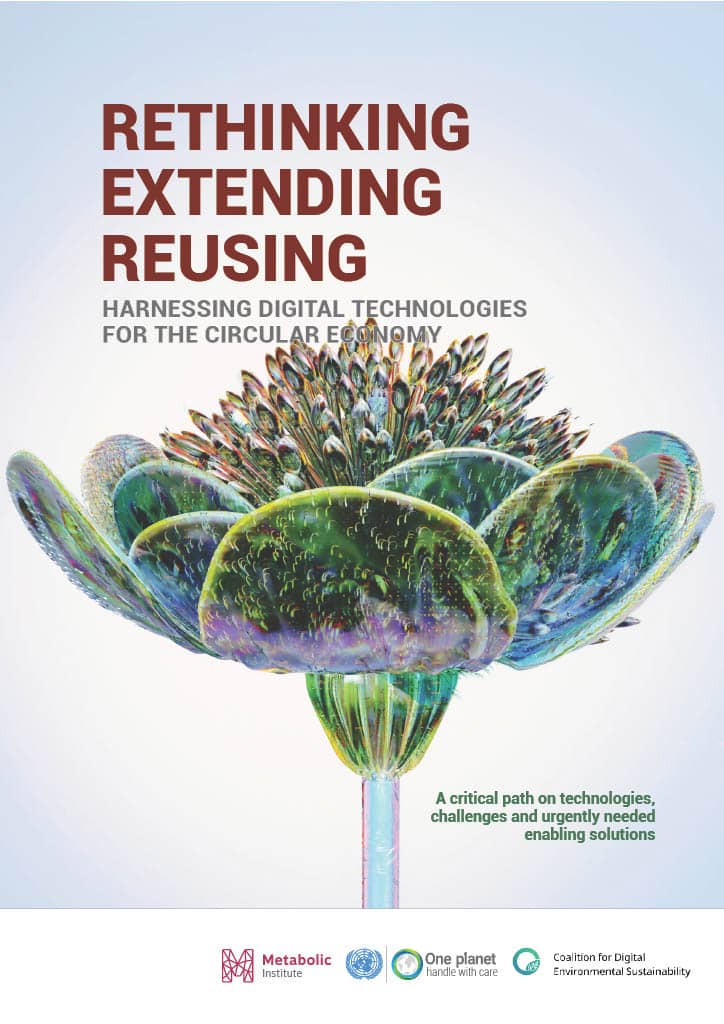Harnessing digital technologies for the circular economy
An analysis of barriers and opportunities for digital technologies as enablers of the circular economy
In collaboration with the One Planet Network and CODES, we analyzed current barriers to digital technologies’ potential to play a key role in accelerating the transition to a circular economy. Using a systems perspective, we identified short-term solutions for each barrier and provided concrete, feasible, and urgent recommendations for both public and private organizations.
- Partners: One Planet Network, CODES
- Client: UNEP
- Date: January 2023
The exponential growth of digital technologies must be part of the solution, not the problem
Data, digital technologies, and innovations are rapidly spreading worldwide.
For now, their exponential growth shows the same problematic symptoms as the current linear global system, contributing to unprecedented environmental and social risks related to the type of resources they demand (e.g., critical metals, energy), the consumption patterns they accelerate, and the waste they produce (e.g., e-waste).
Despite these challenges, digital technologies have the potential to drive significant global economic, environmental, and social transformations. According to the World Economic Forum, by the end of 2023, more than 60% of global GDP will flow through digital channels. There’s an urgent need to guide the trajectory of digital advancements in alignment with sustainability and circularity goals, positively impacting society and the environment.
Identifying barriers and solutions for circular digital technologies
We combined scientific research with practical insights from experts across alliances and coalitions, businesses, venture capitals, academia, international organizations, and public entities within the spaces of the circular economy, behavior change, innovative investments. Based on this, we looked into:
- How can digital technologies be combined and leveraged to lay a progressive digital foundation for the circular economy?
- What barriers and challenges are currently limiting the integration of digital technologies?
- Which risks are associated with digital technologies in the circular economy, including adverse environmental and social impacts, that must be mitigated within any solutions?
- Which concrete solutions may unlock the potential of digital technologies for the circular economy?
A pathway to harness digital technologies for the circular economy
Our analysis provides concrete short-term solutions, which have been translated into actionable recommendations for the public and private sectors. These recommendations lay the foundation for a critical path supported by The One Planet Network, the Coalition for Digital Environmental Sustainability (CODES), and the United Nations Environment Programme (UNEP).
This study forms the basis for the creation of the Digitalization 4 Circular Economy (D4CE) Impact Initiative. With two dynamic intervention labs at its core, the initiative aims to reshape the landscape of circular economy through:
- Global Digital Standards for Data Transparency and Interoperability
- Digitally Enabled Circular Business Models
Metabolic Institute will be involved with the Global Digital Standards intervention lab, so stay tuned.
"This report, and the continued efforts of this expert group, responds directly to the UNEP MTS 2022-2025 and the UNEP Digital Transformation Programme of Work, as well as the UN Secretary General’s Roadmap for Digital Corporation. The implementation of the critical path outlined in this report is considered of key relevance to UNEP’s Digital Transformation Subprogramme and to the Coalition for Digital Environmental Sustainability (CODES)."
Golestan Sally Radwan, Chief Digital Officer, UNEP






